PC Errata
The Player's Council is a group of volunteers who aim to nurture and guide the future of the Lord of the Rings TCG. One of the aspects of this responsibility is in issuing card-altering errata to address issues with the game--it's not perfect, after all, and we can always chase the elusive perfect ideal.
History
During the lifetime of the game, Decipher would occasionally issue errata, clarifications, or rulings based on the discovery of a negative interaction in the game (such as infinite loops, overly powerful combos, or what have you). In general, Decipher was only willing to directly change the text of a card (errata) if the problem card was in the most recent set or block--if there was a combo involving an older and a newer card, the solution was typically to add the old card to the X-list, banning it from play.
Occasionally Decipher issued what were essentially errata under different names--"clarifications" if the new text was always the intent of the card and it was just poorly written, and "rulings" if the card touched on a more broad concept that could theoretically affect multiple cards (tho often once the ruling was made, they would avoid making future cards that interact with it just for simplicity's sake).
In all cases however, Decipher attempted to make as few errata, clarifications, and rulings as possible. They knew early on that it's never a good feeling to painstakingly construct a deck from your collection, only to show up to a local event and discover that several of the cards that you built as linchpins have been altered and no longer behave the way they were printed in ink.
PC Era
However, in modern times the landscape of the game has changed. Gemp, the digital platform, dominates in number of games played, with about 6,000 per month in 2021 up to a lifetime peak of more than 10,000. That's an average of 200 games per day in 2021, and more than 330 at peak.
Thus, the PC has opted to take an approach more akin to that used in competitive multiplayer video games, instead. Decipher's approach was understandable for the era in which they worked, but today with the growth of the Internet, the moving of the community into online communities, and the acclimation of players in general to the concept of regular balance patches, the idea of altering large numbers of cards on a regular basis is far more available to us than it was to Decipher. Altering ink is a painful process, but altering pixels is trivial.
Identifying
In Gemp, all errata are indicated by a red line across the upper left-hand corner. In addition, all PC errata have a red box in the lower left-hand corner listing the date that the card was last errata'd.
PC Errata
Below is a list of every errata the PC has issued. These errata apply to all formats with "PC" in the name, including Fellowship - PC, Movie - PC, and Expanded - PC.
X-list Errata
The first batch of errata issued by the PC addressed cards which Decipher had already removed from one or more formats. The reasons are myriad, but the intention of these errata is to bring all such cards to a single more balanced state that can be used in any format the card's set is legal in.
| CardName | Revision | Original | Errata | Decipher Notes | PC Notes |
|---|---|---|---|---|---|
The Mirror of Galadriel (1R55) 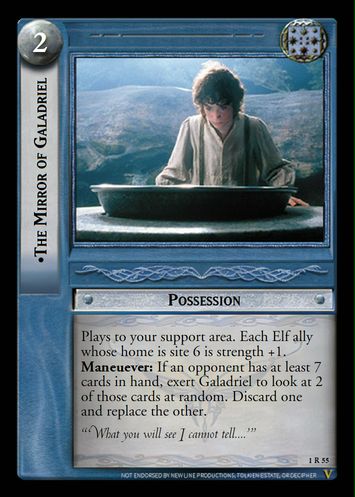 |
2 | 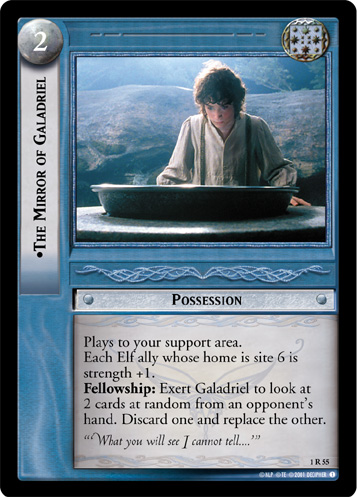 |
 |
Announced in the January 11 2002 FAQ, reprinted as revision B | |
Sam, Son of Hamfast (1C311) 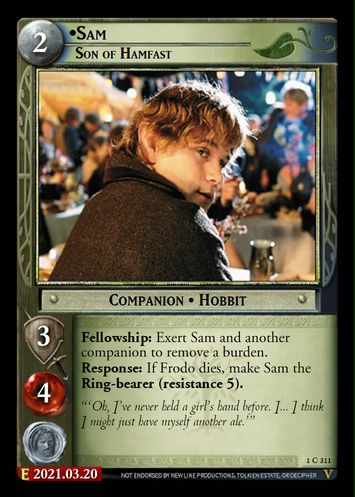 |
1 | 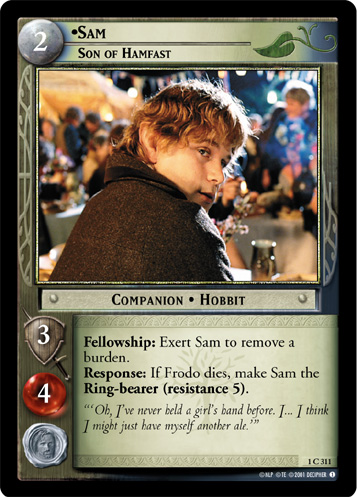 |
 |
Decipher Notes:
This card has been on our X-List radar for quite some time. The deck lists turned in by the top 16 players of each major event this year were a perfect example of why – in every case, at least 15 of them were stocking one or more copies of Sam. He is simply too versatile, offering huge benefits regardless of Free Peoples strategy, and regardless of who your Ring-bearer is. And he’s even better if your Ring-bearer happens to be Frodo. With Shadows, the need to address Sam became even more pressing. With resistance becoming an important feature of all companions (not just Ring-bearer) and it being directly tied to burdens, Sam easily undermined a large number of Shadow cards in the set, and made many Free Peoples cards too reliable (and thus, too strong). |
Sam is tricky, because not only is he approximately the best burden removal option, for many cultures he represents almost the only burden removal option, as many cultures plain do not have access to native anti-corruption options. Sam probably deserves to be nerfed more than he is, but it's not possible to do so reasonably until other burden options have been added to more cultures in the future. Full article here. |
Saruman, Keeper of Isengard (3R68) 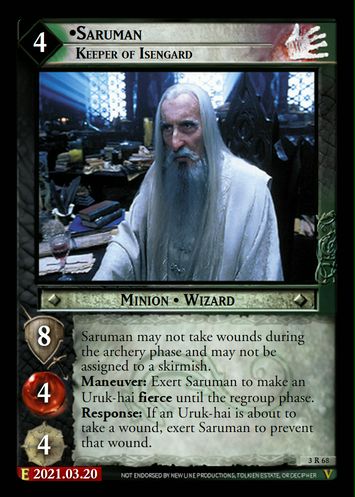 |
1 |  |
 |
Decipher Notes: This card effectively doubles the number of skirmishes a fellowship faces by making all Uruk-hai fierce and then nullifying play that would serve as protection against those Uruk-hai. | Damage +1 and Fierce are no joke, and TTT's focus on uruks makes Saruman a no-go. By merging both of his abilities to use the same resource pool, the player is now forced to make an interesting decision--keep uruks alive, or keep them fierce? Full article here. |
Ottar, Man of Laketown (1R80) 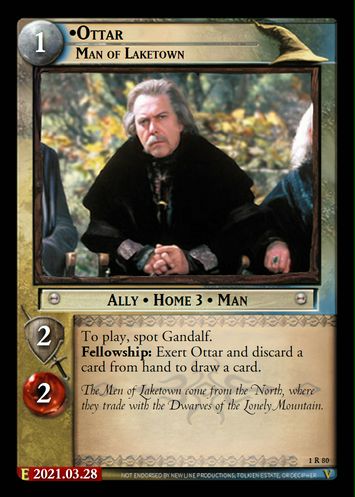 |
1 | 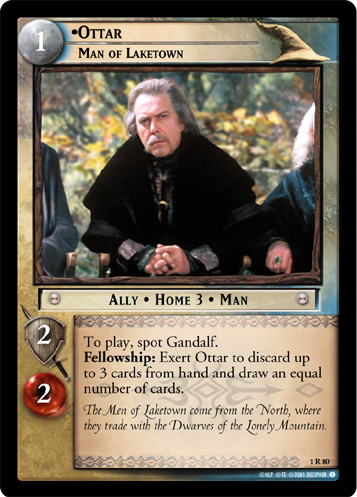 |
 |
Decipher Notes: This card makes large-scale card draw too accessible to all Free Peoples strategies. It requires a very low cultural commitment to a culture that is not supposed to be the strongest at Fellowship phase card draw. | The complaint is straightforward: it permits lots of card draw (and card cycling, even if that goes unmentioned) when Gandalf is not supposed to. He's even worse with Elrond, Lord of Rivendell, whose Home 3 healing ensures that Ottar + Elrond permit a 4 card draw / 3 card cycle every Fellowship phase, which makes most other methods pale in comparison. Our errata is equally straightforward: knock Ottar down to essentially an out-of-phase reconcile once per turn. |
Galadriel, Lady of the Golden Wood (3R17) 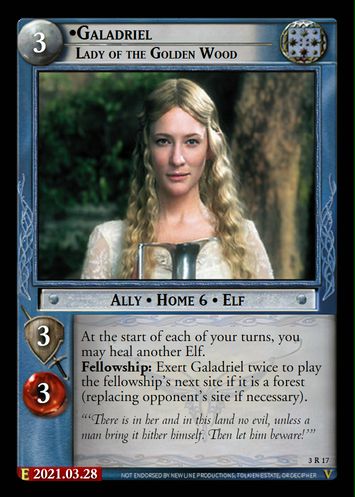 |
1 | 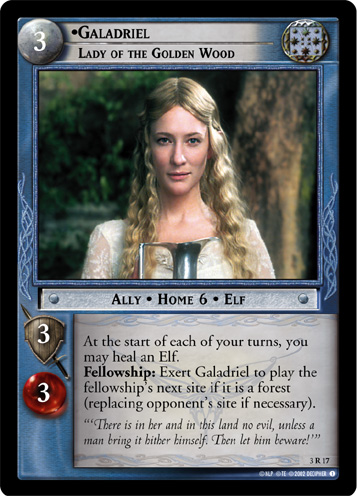 |
 |
Decipher Notes: Again, terrain is hugely important beginning with Shadows. And as with Gimli, this card was both too strong and out of culture. Pathfinding has never been a part of the Elven culture aside from this card, and suddenly Galadriel was enabling Elves to put out an uninterrupted string of forests onto the adventure path. She could even do this for free, since the cost of her exertion could be negated by using her to heal herself. | One wonders at this point if perhaps it's the title of “Galadriel” that needs nerfed rather than any other aspect of the card. Regardless, the Big G was a problem for the Shadows path more than anything. To reduce her ability to trigger literally every turn, her ability has been turned away from herself so that she cannot self-heal, and requiring her to exert twice. Now if you want to abuse her site manipulation, you'll have to pack other means of healing. |
Savagery to Match Their Numbers (1R139) 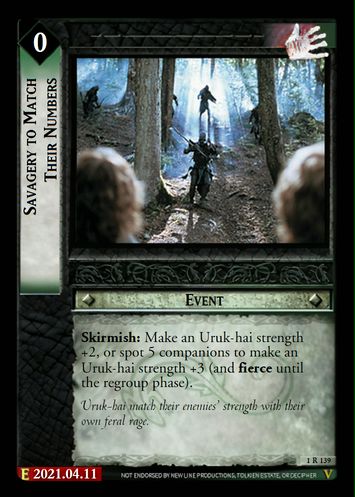 |
1 | 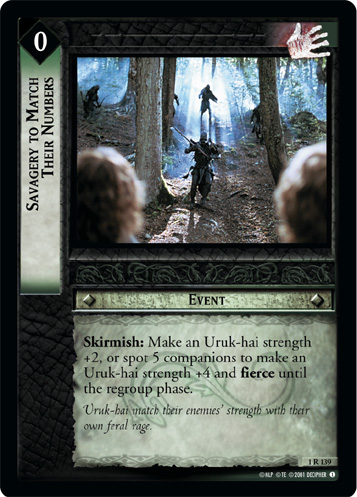 |
 |
Decipher Notes: The secondary function of this card is too strong for its cost, and makes the card superior in almost all situations to any other strength event. | Savagery has long been a power card that requires the Free Peoples player to play around in FOTR block. Most anti-Fellowship-size cards are at the 6 companion limit, but Savagery triggers at 5, meaning that fellowships have to either go with a meager 4 companions or risk losing a couple companions anyway to one instance of this card. The PC has opted to keep the 5 companion spotting element and eliminated the +4 strength boost that lingers to the Regroup phase as the most frustrating aspect of the card. Fierce is scary, but not as scary as one event automatically winning the fierce skirmish for you by dint of the +4 persisting. |
Flaming Brand (2R32) 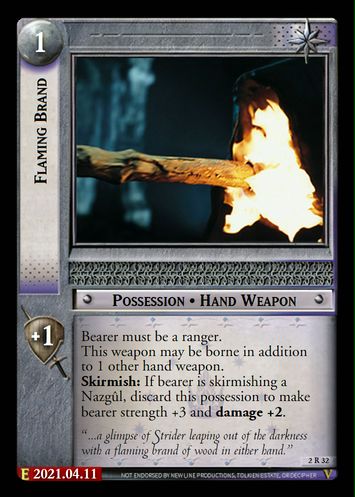 |
1 | 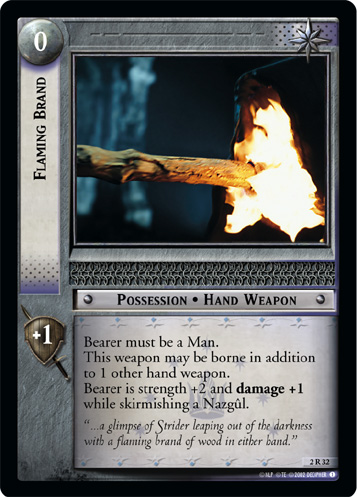 |
 |
Decipher Notes: This card has no cultural enforcement, may be played in addition to another weapon, and has no cost. The resulting combination provides too much utility. | Flaming Brand has no downsides to including--it is never dead weight, as it is at least a +1 strength to any Man of any culture, and potentially quite a bit more. Its dead-simple ease of use makes it an auto-include, which dumpsters Nazgul in any format where Brand is legal.
The bearer restriction has been reworked to Ranger, which allows Arwen but disallows Eomer. A twilight cost has been added to make sure it's no longer zero-downside. And then the ability has been adjusted to burn the brand to kill a nazgul for one turn--not provide an endless beatdown. Full article here. |
2021 Yuletide Errata
The second major batch of errata issued by the PC was done as part of the 2021 12 Days of Yuletide event, which also coincided with the first public playtest release of set V1, Shadow of the Past. These errata intended to push the boundary of what had previously been done with errata, breaking away from Decipher's restrictions further and issuing buffing errata alongside the nerf errata. Several infamous cards were targeted, as well as a number of less-well-known ones.
All PC Errata
| CardName | Revision | Original | Errata |
|---|---|---|---|
Corsair Marauder (8R57) 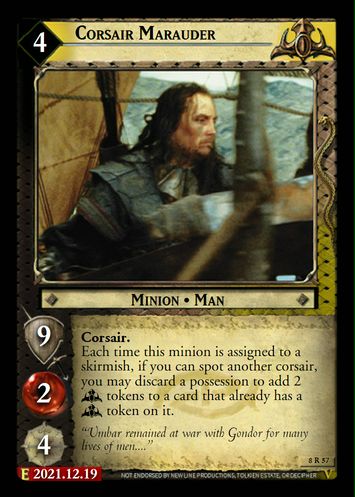 |
1 | 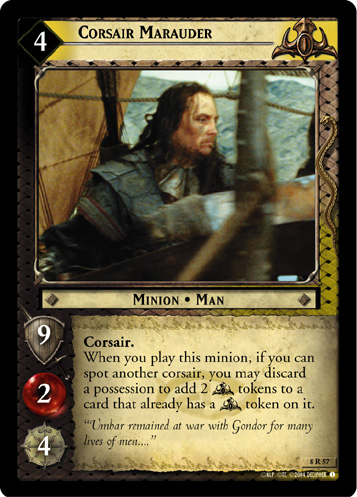 |
 |